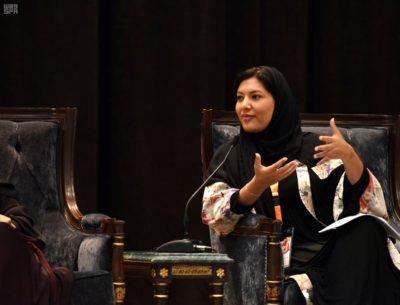Saudi Arabia’s decision to allow women to travel independently is being hailed a historic leap for gender equality in the Kingdom as women celebrate their new rights and freedoms enacted under King Salman and Crown Prince Mohammed bin Salman.
“The new regulations are history in the making,” Princess Reema Bint Bandar, Saudi Arabia’s first woman ambassador to Washington, said on Twitter. “They call for the equal engagement of women and men in our society. It is a holistic approach to gender equality that will unquestionably create real change for Saudi women.”

Princess Reema bint Bandar, Saudi Arabia’s new Ambassador to Washington, D.C.
The princess’ words were echoed by Saudi women on social media and other platforms around the world. Writing in the UK-based BBC, Lulwa Shalhoub, a resident of Jeddah, explained how the move will affect her life.
“Next time I travel abroad, I will not have to worry about the travel permission being updated in the Saudi Passport Directorate’s records or at the Saudi borders. I will pack my suitcase knowing that presenting my green passport, as an adult with full Saudi citizenship, will be sufficient. I will feel solely responsible for my choice to cross borders without a male guardian’s approval.
“Having to obtain a male guardian’s permission to travel abroad has been one of the remaining obstacles that face Saudi women, particularly divorced or widowed women. In some cases, women had to get permission from their sons when they had no living fathers, uncles or brothers.

The new laws permit unprecedented mobility to women, including the right to obtain a passport and travel abroad without a male relative’s permission.
“At last, the definition of adulthood in Saudi Arabia is gender neutral. Both men and women are adults when they reach the age of 21,” Shalhoub wrote.
The new travel freedoms for women were, in fact, just one of the reforms enacted to benefit women and Saudi society at large over the weekend. New laws now protect Saudi women in the workplace from employment discrimination.
According to the Saudi Gazette, the amendments in the labor regulation have stressed that “it is not allowed to discriminate between workers on the basis of gender, disability, age or any other forms of discrimination whether in work, employment or advertising on the vacancy.”
Additionally, authorities have adjusted employment laws so that a female worker cannot be fired or issued a notice of dismissal from her job while she is on a maternity leave.









